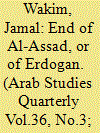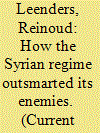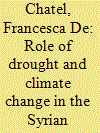|
|
|
Sort Order |
|
|
|
Items / Page
|
|
|
|
|
|
|
| Srl | Item |
| 1 |
ID:
184739


|
|
|
|
|
| Summary/Abstract |
Annotating the history of the Syrian uprising of 2011 in poetic form, these poems focus on protests by Syrian women. The key goals of the 2011 Syrian uprising were first articulated in Kurdish protests such as the one led by Kurdish activist Hervene Ose, depicted in the first poem in this selection by Kahf. ‘The Street Is Ours’ was an early and long-running protest campaign engineered by women of Salamiyya, a city where Ismaili Shia affiliation is significant. Rima Dali’s 2012 countrywide campaign, ‘Stop the Killing: We Want to Build a Syria for Everyone’ was active in Suweyda, where the Druze demographic is important. Syrian women’s protests, particularly by women outside the mainstream ethnic and confessional backgrounds, were marginalised in both international media and in the emerging dominant narrative within the revolution as militarised and masculinist protest activities became normative. The author offers these poems toward an anti-imperialist and transnational feminist analysis of the uprising from a Syrian-centred feminist perspective that demands attention to Syrian diversity. We are often told that the revolution ‘failed.’ It has not failed; it is in process more than ever, and working on ourselves so that we as Syrians, in diaspora or inside, understand how to dismantle racist, anti-Black, misogynistic, sectarian, and state oppressions that structure Syria as we have known it, is part of the ongoing Syrian revolution.
|
|
|
|
|
|
|
|
|
|
|
|
|
|
|
|
| 2 |
ID:
134010


|
|
|
|
|
| Publication |
2014.
|
| Summary/Abstract |
In this article, I argue that Turkish Prime Minister Recep Tayyip Erdogan wanted to improve relations with Syria because he wanted Turkey to play a leading role in the Arab world. This role is promoted by the United States which aims at creating an alliance between Turkey and the Arab states to block Russia, China, and Iran from having access to the East Mediterranean or the Indian Ocean. Turkey's reward would be to have access to Arab markets and oil. Syrian President Bashar al-Assad was tempted by the United States, Turkey, and conservative Arab regimes to sever his ties with Iran, which he refused to do. Therefore, the former powers supported the Syrian uprising (which started as domestic protests against dictatorship, corruption, and misrule) to topple al-Assad. However, two and half years since the Syrian uprising started, the al-Assad regime seems to be resisting the attempts of his opponents to topple it, which would mean a failure of Erdogan in his political bet and might even lead to his downfall, especially after the eruption of protests against Erdogan throughout Turkey in early June 2013.
|
|
|
|
|
|
|
|
|
|
|
|
|
|
|
|
| 3 |
ID:
126053


|
|
|
| 4 |
ID:
125164


|
|
|
|
|
| Publication |
2013.
|
| Summary/Abstract |
The Assad government watched how uprisings unfolded in Tunisia, Egypt, and Libya, took stock of international reactions to these events, and, in response, developed strategies to maximize its probabilities of survival.
|
|
|
|
|
|
|
|
|
|
|
|
|
|
|
|
| 5 |
ID:
131455


|
|
|
|
|
| Publication |
2014.
|
| Summary/Abstract |
This article examines the role of drought and climate change as triggers of the Syrian uprising that started in March 2011. It frames the 2006-10 drought that struck north-eastern Syria in the context of rapid economic liberalization and long-standing resource mismanagement, and shows that the humanitarian crisis of the late 2000s largely predated the drought period. It argues that focusing on external factors like drought and climate change in the context of the Syrian uprising is counterproductive as it diverts attention from more fundamental political and economic motives behind the protests and shifts responsibility away from the Syrian government.
|
|
|
|
|
|
|
|
|
|
|
|
|
|
|
|
| 6 |
ID:
162529


|
|
|
|
|
|
|
|